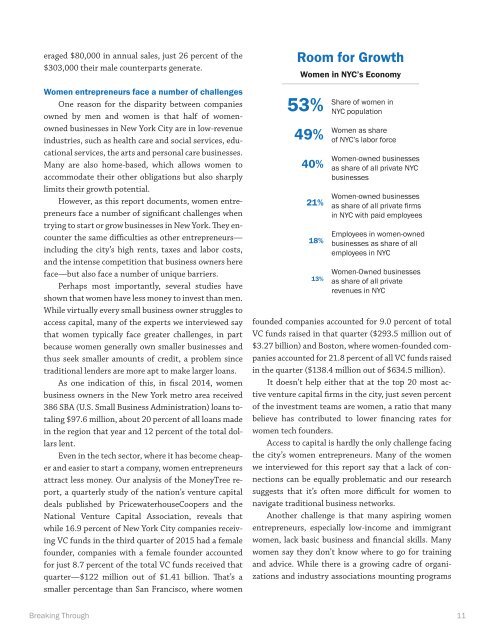BREAKING THROUGH
YWkgl
YWkgl
Create successful ePaper yourself
Turn your PDF publications into a flip-book with our unique Google optimized e-Paper software.
eraged $80,000 in annual sales, just 26 percent of the<br />
$303,000 their male counterparts generate.<br />
Women entrepreneurs face a number of challenges<br />
One reason for the disparity between companies<br />
owned by men and women is that half of womenowned<br />
businesses in New York City are in low-revenue<br />
industries, such as health care and social services, educational<br />
services, the arts and personal care businesses.<br />
Many are also home-based, which allows women to<br />
accommodate their other obligations but also sharply<br />
limits their growth potential.<br />
However, as this report documents, women entrepreneurs<br />
face a number of significant challenges when<br />
trying to start or grow businesses in New York. They encounter<br />
the same difficulties as other entrepreneurs—<br />
including the city’s high rents, taxes and labor costs,<br />
and the intense competition that business owners here<br />
face—but also face a number of unique barriers.<br />
Perhaps most importantly, several studies have<br />
shown that women have less money to invest than men.<br />
While virtually every small business owner struggles to<br />
access capital, many of the experts we interviewed say<br />
that women typically face greater challenges, in part<br />
because women generally own smaller businesses and<br />
thus seek smaller amounts of credit, a problem since<br />
traditional lenders are more apt to make larger loans.<br />
As one indication of this, in fiscal 2014, women<br />
business owners in the New York metro area received<br />
386 SBA (U.S. Small Business Administration) loans totaling<br />
$97.6 million, about 20 percent of all loans made<br />
in the region that year and 12 percent of the total dollars<br />
lent.<br />
Even in the tech sector, where it has become cheaper<br />
and easier to start a company, women entrepreneurs<br />
attract less money. Our analysis of the MoneyTree report,<br />
a quarterly study of the nation’s venture capital<br />
deals published by PricewaterhouseCoopers and the<br />
National Venture Capital Association, reveals that<br />
while 16.9 percent of New York City companies receiving<br />
VC funds in the third quarter of 2015 had a female<br />
founder, companies with a female founder accounted<br />
for just 8.7 percent of the total VC funds received that<br />
quarter—$122 million out of $1.41 billion. That’s a<br />
smaller percentage than San Francisco, where women<br />
Room for Growth<br />
Women in NYC’s Economy<br />
53%<br />
49%<br />
40%<br />
21%<br />
18%<br />
13%<br />
Share of women in<br />
NYC population<br />
Women as share<br />
of NYC’s labor force<br />
Women-owned businesses<br />
as share of all private NYC<br />
businesses<br />
Women-owned businesses<br />
as share of all private firms<br />
in NYC with paid employees<br />
Employees in women-owned<br />
businesses as share of all<br />
employees in NYC<br />
Women-Owned businesses<br />
as share of all private<br />
revenues in NYC<br />
founded companies accounted for 9.0 percent of total<br />
VC funds raised in that quarter ($293.5 million out of<br />
$3.27 billion) and Boston, where women-founded companies<br />
accounted for 21.8 percent of all VC funds raised<br />
in the quarter ($138.4 million out of $634.5 million).<br />
It doesn’t help either that at the top 20 most active<br />
venture capital firms in the city, just seven percent<br />
of the investment teams are women, a ratio that many<br />
believe has contributed to lower financing rates for<br />
women tech founders.<br />
Access to capital is hardly the only challenge facing<br />
the city’s women entrepreneurs. Many of the women<br />
we interviewed for this report say that a lack of connections<br />
can be equally problematic and our research<br />
suggests that it’s often more difficult for women to<br />
navigate traditional business networks.<br />
Another challenge is that many aspiring women<br />
entrepreneurs, especially low-income and immigrant<br />
women, lack basic business and financial skills. Many<br />
women say they don’t know where to go for training<br />
and advice. While there is a growing cadre of organizations<br />
and industry associations mounting programs<br />
Breaking Through 11


